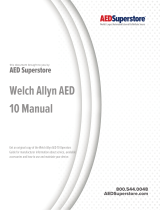
SKIN PREPARATION
OPERATING TEMPERATURE:
SHORT TERM STORAGE TEMPERATURE:
LONG TERM STORAGE TEMPERATURE:
0°C to 50°C (32°F to 122°F)
-30°C to 65°C (-22°F to 149°F)
0°C to 35°C (32°F to 95°F)
ENGLISH
Page 1 of 22 R2027-07 Rev. G
Pediatric Electrodes
TM
OneStep
INDICATIONS FOR USE
For use on pediatric patients with ZOLL® defibrillators, such as R Series
®
, by trained personnel including physicians, nurses,
paramedics, emergency medical technicians and cardiovascular laboratory technicians. OneStep Pediatric electrodes are indicated for use on
patient less than 8 years of age or weighing less than 55lbs (25kg).
Defibrillation Noninvasive Pacing Cardioversion ECG monitoring
PRECONNECTING THE ELECTRODES
Instructions for Use
1
2
SkinPad
1. Apply one edge of the pad securely to the patient.
2. "Roll" the pad smoothly from that edge to the other. Be careful not to trap any pockets of air
between the gel and skin.
3. Connect electrodes to Defibrillator/Pacer cable.
4. Connect ECG leads for demand pacing.
Use of R Series with adult electrodes or pediatric electrodes other than
OneStep Pediatric Electrodes can result in adult oriented shock advisory
outcome and the delivery of adult energies to pediatric patients.
Pediatric energy levels must be manually set to site-specific clinical
protocols when using OneStep Pediatric Electrodes on defibrillators
other than R Series. Refer to defibrillator operator’s manual.
Grasp the Back/Sternum electrode at the
bottom and peel from the plastic liner.
Apply electrode centered along spine of patient.
Always apply Back electrode first.
If Front electrode is already in place
when patient is being maneuvered
for placement of the Back electrode,
the Front electrode may become
partially lifted. This could lead to
arcing and skin burns.
7. Electrodes should be replaced after 24 hours of use
or 1 hour of pacing.
8. These electrodes are recommended for patients
weighing less than 55lbs (25kg). For patients over
55lbs (25kg), adult electrodes are recommended. Do
not delay therapy to determine actual weight of
patient during emergency.
9. U.S. Federal law restricts this device to use by or on
the order of a physician.
10. Avoid electrode placement near the generator of an
internal pacemaker, other electrodes or metal parts in
contact with the patient.
11. Some current generated by electrosurgical units (ESU)
may concentrate in the conductive gel of defibrillation
electrodes, especially if an ESU grounding pad other
than that recommended by the ESU manufacturer is
used. Consult the ESU operator’s manual for further
details.
12. To avoid electrical shock, do not touch the pads,
patient, or bed when defibrillating.
13. Do not discharge standard paddles on or through
electrodes or place separate ECG leads under pads.
Doing so could lead to arcing and/or skin burning.
14. Use only with ZOLL pacemaker/defibrillator products.
15. Device disposal shall follow hospital protocol.
1. Use of R Series with pediatric electrodes other than
OneStep Pediatric Electrodes can result in adult oriented
shock advisory outcome, and the delivery of adult
energies to pediatric patients.
2. Pediatric energy levels must be manually set to
site-specific clinical protocols when using OneStep
Pediatric Electrodes on defibrillators other than R Series.
Refer to defibrillator operator’s manual.
3. Do not use if gel is dry. Dried out gel can lead to skin
burning. Do not open pouch until ready to use. Do not
use the electrodes past the expiration date printed on the
pouch label.
4. Do not fold the electrodes or packaging. Any fold in or
other damage to the conductive element could lead to the
possibility of arcing and/or skin burns.
5. After patient movement due to muscle contraction or
patient repositioning, press pads to skin to ensure good
coupling between pads and skin.
6. Continuous pacing of patients could cause burns.
Periodic inspection of the underlying skin, at least every
30 minutes during pacing, is strongly advised.
Grasp the Apex/Front electrode at the
bottom and peel from the plastic liner.
Apply over cardiac apex with the nipple
alongside adhesive area.
Avoid any contact between nipple and
gel treatment area. Skin of the nipple
area is more susceptible to burning.
BACK FRONT
Recommended for defibrillation, noninvasive pacing, cardioversion, and ECG monitoring of pediatric patients.
ELECTRODE APPLICATION
ELECTRODE PLACEMENT (ANTERIOR-POSTERIOR)
ZOLL International Holding B.V.
Newtonweg 18 6662 PV ELST
The Netherlands Tel. +31 (0) 481 366410
®
ZOLL Medical Corporation
269 Mill Road
Chelmsford, MA 01824-4105 USA
800-348-9011 Made in USA
Rx ONLY
NOT MADE WITH
NATURAL RUBBER
LATEX.
32° F
0° C
50° C
122° F
WARNINGS
1. Do not open until ready to use.
2. Periodically inspect electrode packaging for integrity & expiration date.
3. Attach electrode connector to ZOLL OneStep cable or Multi-Function cable.
4. Open electrode package by pulling apart at yellow arrow.
5. Self test connection disengages after the electrode has been removed from the liner.
Instructions
Poor adherence and/or air
under the electrodes can lead
to the possibility of arcing and
skin burns.
1. Remove excess chest hair. Clip if necessary to maximize gel to skin contact. Clipping is recommended
since shaving can leave tiny microabrasions that can lead to patient discomfort during pacing.
2. Ensure skin is clean and dry under electrode. Remove any debris, ointments, skin preps, etc.
with water (and mild soap if needed). Wipe off excess moisture/diaphoresis with dry cloth.
Instructions
Excessive hair can inhibit good
coupling (contact), which can
lead to the possibility of arcing
and skin burns.

